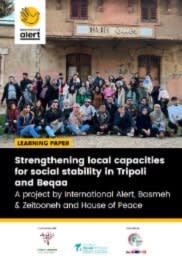From 'I' to 'We': Fostering social cohesion in schools and beyond
Building inclusive and peaceful communities starts at school. Safe, welcoming learning spaces that prioritise cohesion can nurture empathetic, open-minded learners who lay the foundations for more resilient societies.
Equipping teachers, parents and students with skills and knowledge to resolve conflicts peacefully and embrace diversity is essential, especially in areas affected by conflicts. The Social Cohesion Toolkit is a comprehensive resource developed by International Alert in a consortium of partners in Lebanon to support school communities in achieving this goal.
This toolkit aims to prevent violence and strengthen social cohesion in schools or other learning spaces by enhancing students’, teachers’ and caregivers’ sense of belonging to the school community.
It is available in English, Arabic and French. The Toolkit has been developed in collaboration with the Center for Educational Research and Development and endorsed by the Lebanese Ministry of Education.
What’s in the Social Cohesion Toolkit?
The Toolkit contains several components that work together to promote social cohesion within a school and its surrounding community. It contains:
- Assessment tools for educators and administrators to evaluate the existing levels of social cohesion and identify areas that need improvement.
- A wide range of activities designed to promote communication, empathy, and understanding between different groups within the community and encourage students to engage in positive behaviors that foster a sense of belonging.
- Strategies for engaging with the broader community that can help to create a sense of unity and shared purpose between the school and the surrounding community.
Who is it for?
The Social Cohesion Toolkit will be helpful for anyone invested in promoting social cohesion and creating a more inclusive and welcoming environment in and through education.
- Educators and school leaders can use the toolkit to develop strategies and activities that promote social cohesion within the school community.
- Community leaders and NGOs can use the toolkit to collaborate with schools and promote social cohesion within the broader community.






